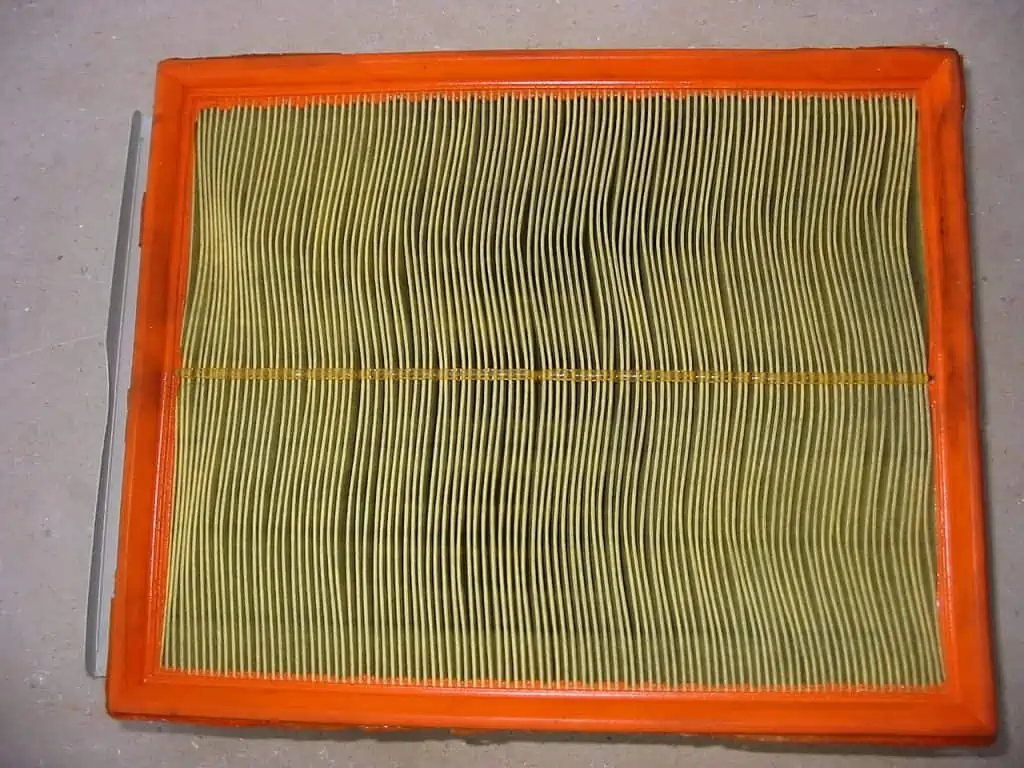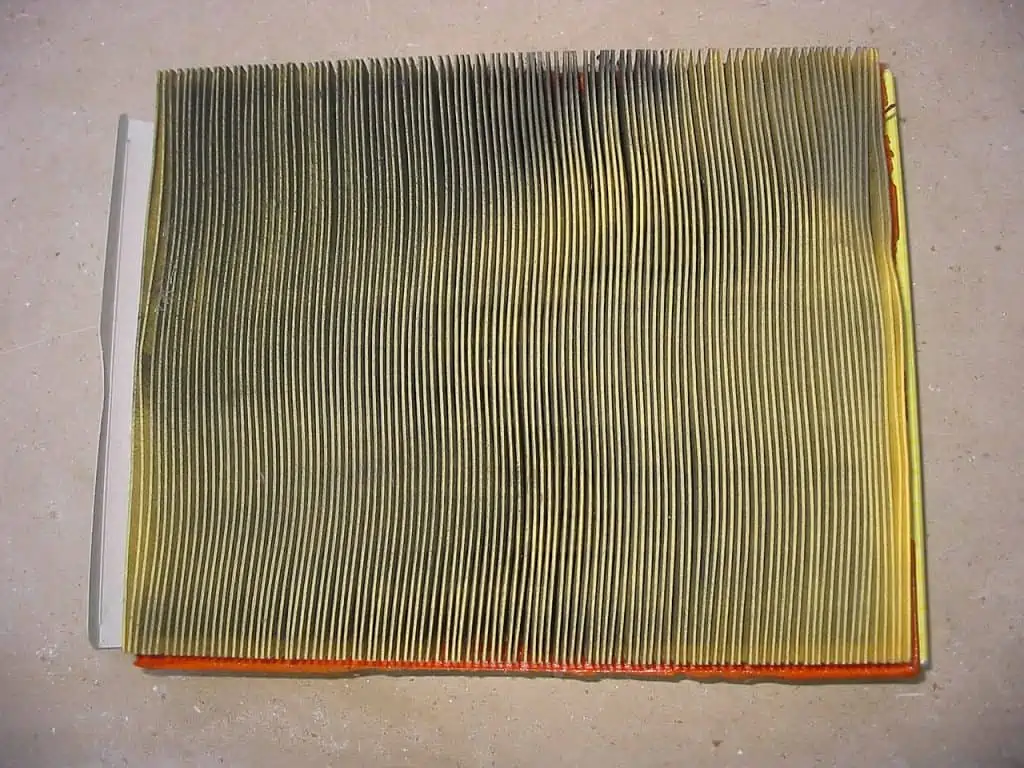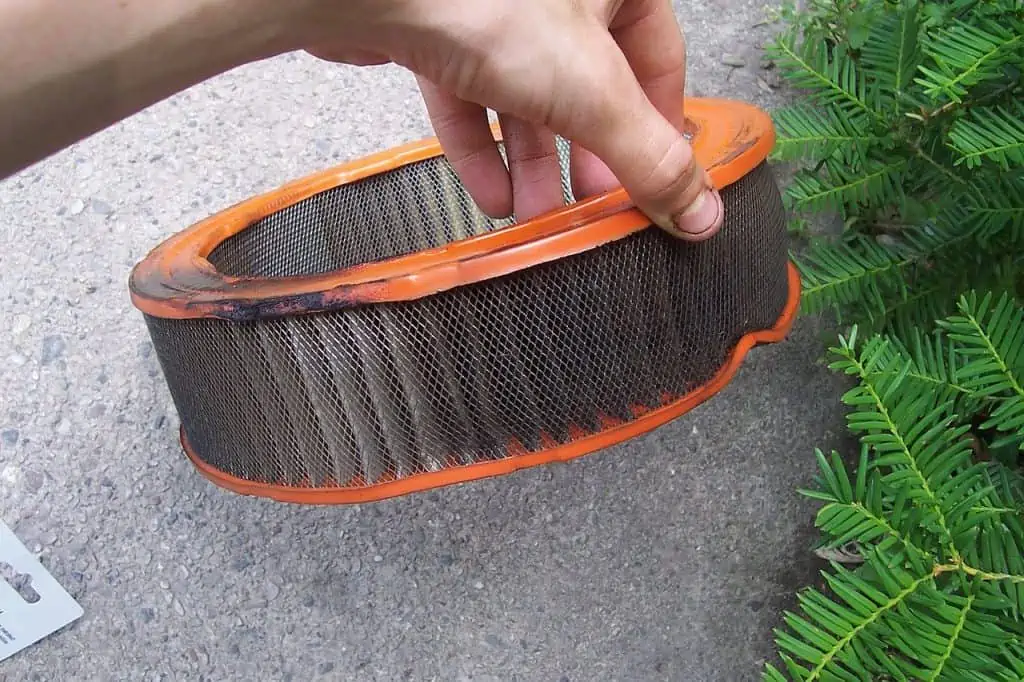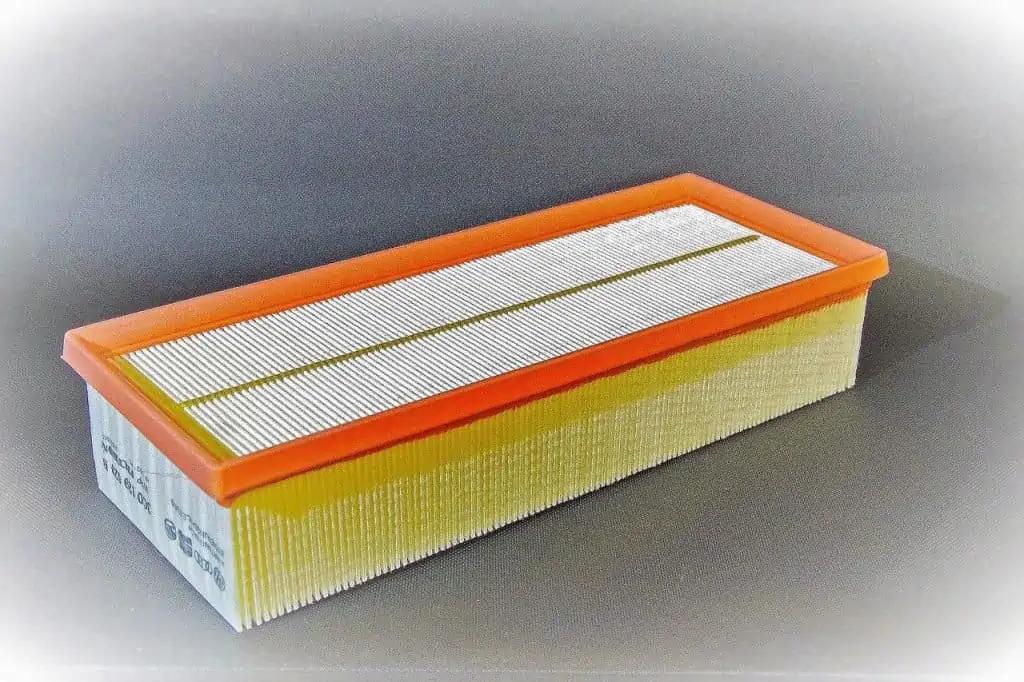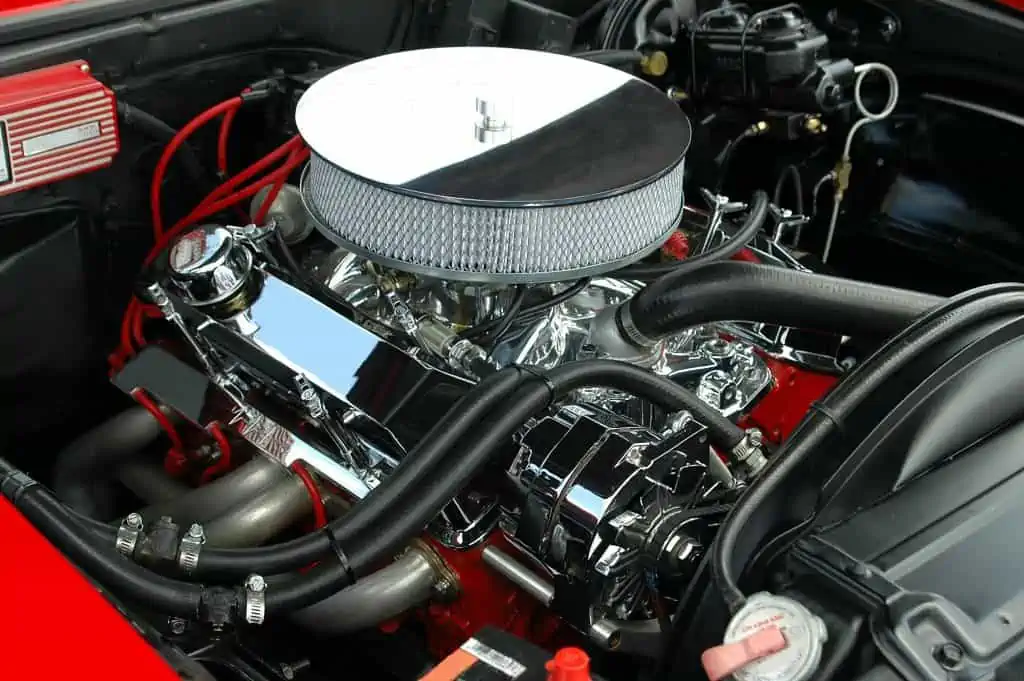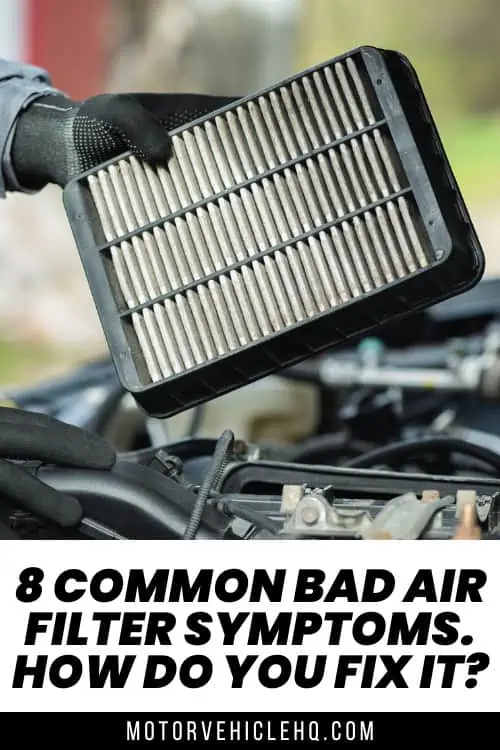Every vehicle engine includes a combustion chamber, and for this chamber to produce enough power to drive your car engine, the air is a must. But the air that passes through the engine must be pure and untainted.
An air filter is essential at this point because it prevents dirty air from reaching your engine.
The air filter in a car will unquestionably become dirty over time due to its essential role. Because of the restricted airflow into the engine, defective or poor air filters reduce your car’s performance.
To keep your engine clear of debris, as a car owner, you should be aware of the signs of a dirty/clogged air filter. Continue reading to find out more about air filters and how to change a deficient air filter.
The air entering the engine is cleaned by a vehicle air filter. Engine misfires, strange sounds, and decreased fuel efficiency are all indicators of a dirty/clogged air filter. In the combustion chamber of a vehicle engine, fuel and air are combined to produce power.
An air filter helps to keep out impurities like road grime, dirt, insects, and other particles that might harm the engine before this air ever gets to the engine.
The engine needs enough air to function correctly, and the air filter needs to allow for that. The performance of your vehicle as a whole may suffer if the air filter gets soiled and clogged over time.
An Air Filter: What Is It?
A dirty/clogged air filter may be the cause of an older vehicle’s engine sputtering and spewing out black smoke. The check engine light will illuminate because the air filter is beyond its prime long before a newer vehicle starts to smoke.
Used auto engine air filter clean side by Donar Reiskoffer / CC BY 3.0. Your fuel economy will remain where it should be by maintaining a clean air filter, which keeps the air circulating. Insufficient fresh air may cause your engine to consume more gas to generate the necessary power. A clean air filter might help you cut your gas expenses.
To keep the air entering the engine free of impurities, an air filter is a very basic part of the air intake system. The screen prevents anything from blowing into the grill of your car, including bugs, water, dirt, pollen, and filth from the road.
One of the easiest components to replace or clean is the air filter. Lift out the filter after removing the intake pipe from the air collection box. Place the filter in front of the light. Clean it or get a new one if you can’t see any light through it.
What Functions Do Engine Air Filters Serve?
Vehicle air filters purify the air inside a car so that passengers can breathe in safe, healthy air. The two types of car air filters are panel style, which is typical of fuel-injected vehicles, and radial style, which is frequently seen in carbureted cars.
An automotive air filter is often found at the side or center top of the engine, enclosed in black plastic or metal casing. The engine’s cylinders, walls, pistons, and rings might be severely damaged by dirt particles, which the filter can remove. The longevity and efficiency of your car’s engine may be significantly impacted by routine filter replacement.
A good general rule of thumb is to replace your air filter once or twice yearly, or around every 15,000 miles. Your vehicle engine benefits from changing a clogged air filter: it increases fuel efficiency by up to 10%, translating into equivalent fuel savings of up to 15% per gallon.
In unclean and dusty driving circumstances, air filter changes would be necessary more frequently. Avoiding putting the wrong kind of air filter in your car is crucial.
Air filters based on nanotechnology are being used by car owners to improve the quality of their cabin air. Layers of charcoal in these air filters serve as odor-absorbing agents.
These filters allow for mechanical filtering, which catches particles larger than the pores in the filter’s fiber composition. Nearly 80% of cars sold worldwide come with air filters made using nanotechnology.
Where Is the Air Filter Located In a Car?
Under the hood of modern cars is an engine air filter. It is often located in the front of the engine compartment in a rectangular cold air box that is simple to reach.
The position of the air filter can be different if you drive an older vehicle with a carburetor. Large, rounded metal air cleaners that are practically hard to miss are used in these autos.
Never mix up the engine air filter with the cabin air filter. The cabin filter maintains a healthy level of indoor air quality. Typically, you may find it beneath the dashboard or in the glove box.
Which Ones are the Typical Signs of a Malfunctioning Air Filter?
Although having mechanical problems is a necessary aspect of owning a car, you may extend the life of your vehicle by doing routine maintenance.
The secret to owning a safe and dependable vehicle is regular, thorough car maintenance. Additionally, doing a few quick, affordable chores might prevent more time-consuming, expensive repairs in the future.
One such chore is changing the air filter in your vehicle. Every car’s engine requires oxygen to function, and an air filter makes sure that only clean, healthy air gets in. An air filter gives your engine the air it needs to operate at its optimum by preventing dirt, bugs, sand, particulates, and dust from entering your engine.
Used auto engine air filter, dirty side by Donar Reiskoffer / CC BY 3.0. The sputtering and black smoke coming from an older vehicle’s engine might be the result of a dirty air filter. Long before a modern car starts to smoke, the check engine light will come on because the air filter is worn out.
However, air filters do not endure forever. They must be changed when they become clogged with all the dirt and dust they have filtered out over time. How do you determine when to replace your air filter? The top eight signs are listed here.
1. The Air Filter That Seems Visually Dirty
The filter’s actual look is one of the simplest signs to identify. Fresh filters have an almost white appearance. Your filter will become dirty/clogged and turn brown or black over time as a result of airborne pollutants.
Your initial confirmation of a defective car air filter may come from a visual examination. Always inspect your filter in a well-lit area. It can be necessary to clear it out if it looks to be polluted with dirt, dust, and debris.
2. A Reduced Level of Gas Mileage
Gas mileage dropping is typically a clue that something is wrong. Your air filter helps with fuel economy, but a dirty/clogged filter might result in less oxygen flowing through your engine. This requires a vehicle to use extra gasoline to make up for it.
Maintaining a clean air filter keeps the air moving and your fuel efficiency where it needs to be.
A decrease in fuel efficiency in an older carbureted vehicle is a frequent indication that the air filter needs to be cleaned. The right mixture of fuel and air is created in the carburetor to facilitate combustion.
Your engine may use more gas to make the power it needs to operate if it doesn’t have enough fresh air to do so. You may save your gas costs with a clean air filter.
Modern fuel-injected vehicles employ the onboard computer to automatically regulate the fuel flow and obtain the ideal air and fuel combination. The gas economy of contemporary vehicles is not much impacted by the air filter.
3. Misses or Misfires with Your Engine
Do you have trouble getting your car to start? Is it difficult to start, or does the engine need to be revved? Your vehicle may have a low air-to-fuel ratio if it struggles to start.
Engine flooding and spark plug pollution can occur when the fuel-to-air ratio is too high. Misfires or startup issues may come from this. The air filter should be checked first if your car struggles to start or has a rough idle.
A blocked engine air filter is the likely cause of engine misfires, harsh idling, and difficult starts. Unburned gasoline forms a sooty deposit on the spark plug as a result of the dirty/clogged air filter restricting airflow to the engine.
The spark plug(s) get dirty as a result, making it harder for them to produce the spark that the combustion process requires. Your engine’s performance will be improved by replacing the air filter and any damaged spark plugs.
4. Unusual Sounds from the Engine Bay
What noise does your vehicle make while it is parked? An engine with adequate oxygen flow should purr evenly and smoothly. You may have a faulty air filter if your idle is rattly or you hear vibrations or hiccups.
Spark plug contamination from problems with the air intake is a typical cause of this problem. If you find that your air filter has to be replaced, it’s a good idea to also check the spark plugs to see if they have any damage as well. Your engine will idle much more smoothly if you replace these two components.
5. When the Check Engine Light Is On
Deposits in the engine are one of several causes for your check engine light to come on. When contaminants enter the engine, they can accumulate over time and, if they start to affect engine performance, generate a buildup that sets off the service light.
Changing your air filter once or twice a year, or around every 15,000 miles, is a decent general rule of thumb. By improving fuel economy by up to 10% and resulting in equivalent fuel savings of up to 15% per gallon, cleaning a clogged air filter improves your car’s engine.
A vehicle has to be able to take in thousands of gallons of air for every gallon of gasoline it uses to digest the fuel effectively. Without air, a crucial component of combustion engines, they cannot operate!
You should get your check engine light examined as soon as it illuminates to determine the problem. An expert can interpret your service code and assist you in figuring out whether it has anything to do with air intake problems.
6. Decrease in Horsepower
If your acceleration appears sluggish, oxygen depletion may be the cause of your horsepower’s poor performance. Most likely, if your vehicle responds slowly or jerks when accelerating, it isn’t getting the air it needs to operate at its best.
The engine’s performance has a direct impact on how much horsepower a car has. To keep up with the decreased oxygen, the engine is pushing more fuel into the combustion chamber. Your horsepower will be drastically reduced as a result of the power being redirected.
7. Flames or Black, Sooty Smoke Coming from the Exhaust
Some of the fuel may not burn all the way through during the combustion cycle as a result of the insufficient air supply. Then, the exhaust pipe allows the unburned gasoline to leave the vehicle.
Ask your mechanic to clean or replace the air filter if you notice black smoke coming from your exhaust pipe. The heat from the exhaust system igniting the unburned gasoline close to the tailpipe may also cause popping noises or a flame to appear at the end of the exhaust. It is important to get this issue addressed straight away since it might be dangerous.
When oxygen has a hard time getting to the engine, gasoline may not be burned off quickly enough. Some of the gasoline may end up seeping through the system and out of your exhaust pipe as a result of this. As superheated gasoline is released through your exhaust system, you can also hear popping sounds.
This problem wastes gasoline and poses a serious risk to the environment and your car. Be sure to investigate any strange exhaust fumes.
8. The Feeling of Gasoline Smell Upon Starting the Car
When you start the vehicle, surplus unburned gasoline escapes via the exhaust pipe if there is insufficient oxygen entering the carburetor or fuel ejection system. You’ll smell gasoline flowing from the exhaust pipe rather than seeing smoke or flames. This is a blatant sign that the air filter needs to be changed.
Your car’s lifetime and engine performance benefit from replacing the air filter. To keep the vehicle operating smoothly, dangerous debris is prevented from harming critical components by engine air filters.
By assisting in maintaining the proper air-to-fuel ratio and reducing excessive gasoline use, they support efficient driving. The dirty filters prevent the system from receiving the proper quantity of air or fuel, which makes it more difficult for the engine to carry out its function. For a car to run as efficiently as possible, the engine air filter must be in perfect condition.
What are the Advantages of Changing Your Car’s Air Filters?
Although it may not seem like a vital part to inspect and replace regularly, air filters are crucial to preserving your car’s performance. The filter stops tiny particles from getting into the engine and potentially causing expensive damage (read more here). However, as you can see below, there are other advantages as well.
1. You Get a Higher Fuel Economy
Depending on the make and model of your vehicle, replacing a clogged air filter can enhance acceleration and boost fuel efficiency. Knowing that it makes sense to update your air filters regularly.
The most common reason for engine misfires, rough idling, and challenging starts is a clogged engine air filter. Due to the clogged air filter reducing airflow to the engine, unburned gasoline collects as a sooty deposit on the spark plug.
Why does an air filter matter so much? The quantity of air that can enter the engine of your vehicle is restricted by a dirty/clogged or broken air filter, which forces the engine to work harder and consumes more gasoline. It’s crucial to avoid restricting this airflow since your engine requires more than 10,000 liters of oxygen to burn every liter of gasoline.
2. Your Car Experiences Lower Emissions
Reduced airflow to the engine from dirty or broken air filters alters the ratio of air to gasoline in your vehicle. This imbalance can create engine deposits, contaminate spark plugs, and turn on the “Service Engine” light. It can also cause the engine to miss or idle poorly.
More significantly, the imbalance directly affects the exhaust emissions from your vehicle, adding to the pollution of the air around you.
3. An Increase In the Engine’s Life
A broken air filter can allow a salt grain-sized particle to cause extensive damage that can become too expensive to fix, especially the internal engine components like cylinders and pistons. That is why it’s crucial to replace your air filter regularly.
To keep dirt and debris from entering the combustion chamber and resulting in expensive repairs, a clean air filter is made to trap them from the outside air.
The Replacement of Your Air Filters
In the event of any damage, your air filters should be changed. However, it is advised to change your air filters at least every 12,000 to 15,000 miles to get the best performance from your vehicle (19,000 to 24,000 km).
If you frequently drive in dusty circumstances, you should shorten this interval. It’s preferable to look up the recommended replacement plan in the maintenance schedule that your car’s manufacturer has given.
What Occurs If the Bad Engine Air Filter on Your Car Isn’t Replaced?
What occurs when you breathe contaminated air? You splutter, cough, and breathe in dust. If you don’t replace the engine air filter, your engine will also suffer from this problem. The engine might be noisy.
Power and/or fuel economy might be lost. If your engine misfires or displays a lean condition, which is an indication that your mass air flow sensor is unclean or has failed, the check engine light may come on.
A clogged air filter has the potential to lead to more severe issues down the road, but it’s so inexpensive and simple to replace (parts range from $20 to $40), so you might as well do it yourself.
What Is the Cost of Changing a Bad Engine Air Filter?
Depending on whether you hire a mechanic or do it yourself, the cost to replace an engine air filter ranges from $20 to $85.
Taxes, fees, and your specific make and model are not taken into account in this pricing range, which is based on national averages for all vehicles. The cabin air filter, for instance, may also require repairs or maintenance. Use the RepairPal Fair Price Estimator to get a more exact quote depending on your make, model, and location.
The Mechanic’s Fee
A poor air filter replacement often costs between $40 and $85. This amounts to parts and labor costs of $20 to $40.
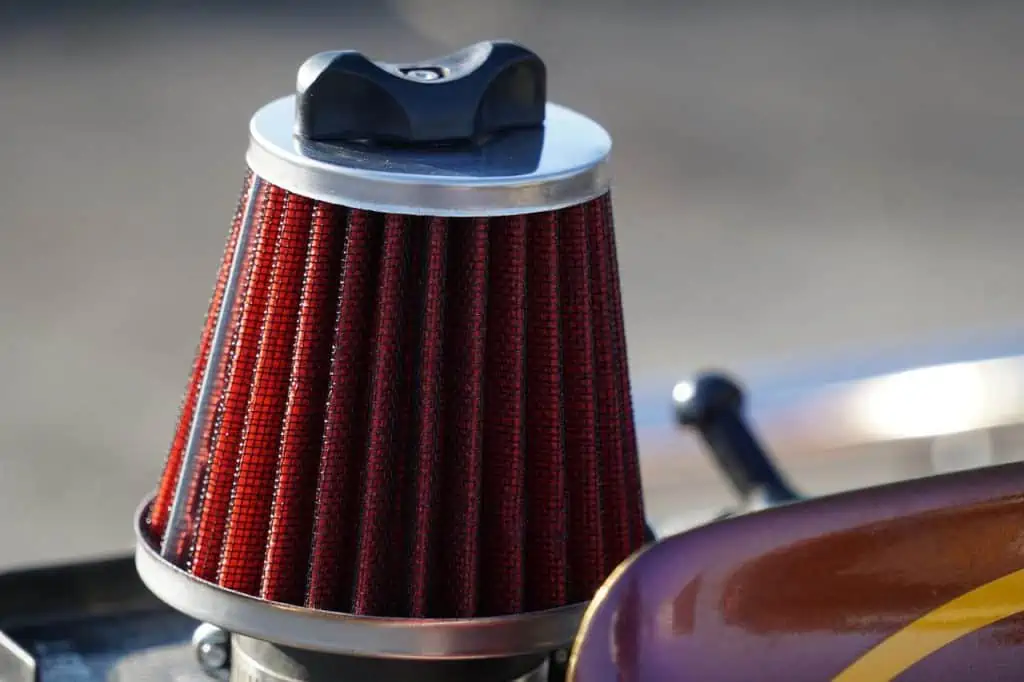
Changing an air filter is often a simple and quick task. Whether you do it yourself or take it to the store, it won’t cost you much. In many cases, you may have it done while getting your oil changed, in which case it won’t take any longer at all. However, doing it yourself will save you both time and money.
The Price of DIY
An air filter replacement DIY project typically costs between $20 and $40. One of the simplest maintenance tasks you may perform on your own is this. Under the hood, engine air filters are simple to reach. To replace them, you often don’t need any tools at all. Depending on the car, you might require a simple wrench or screwdriver, but nothing major. For a novice do-it-yourselfer, this is a fantastic project.
Engine Air Filter Installation Guidelines
Even if you might not be prepared to handle tasks like changing the oil or the spark plugs in your vehicle, you can easily change the engine air filter. Making this repair yourself can save you a lot of money. For changing an air filter, many fast lube businesses charge up to $25 or more.
The engine air filter in your car makes sure that only pure air gets to the engine. Your car needs clean air to operate well. Without an air filter, your engine would suffer harm from the air induction system becoming clogged with bugs, leaves, dirt, and other material.
The right quantity of clean air cannot reach the engine when the engine air filter is unclean, which can cause a variety of issues for your car. You can notice poor engine performance or a lack of power, decreased gas mileage, or your Check Engine light turning on if your car’s air filter is unclean.
Checking your engine air filter should be the first step in troubleshooting should you notice any of these symptoms. At each oil change, it is a good idea to inspect the air filter.
Your engine air filter should be replaced once a year or every 12,000 miles. You should replace the engine air filter more regularly if you reside in a dusty environment. Your engine stays clean by having a clean air filter. Bottom line: Your engine’s first line of defense against dirt and optimal operation is a clean air filter.
Maximum engine performance is ensured when you replace your air filter with a high-quality air filter. You may be certain to locate the best air filter for your vehicle thanks to the many genuine auto shop dealers in the U.S. auto market.
The methods listed below is a step-by-step guideline that will assist you in cleaning or changing your faulty air filter;
Step 1: Purchase the Appropriate Replacement Filter
An auto parts store or its website can aid you in locating the right filter if you need help finding one that fits your vehicle’s airbox. To get the greatest engine life and fuel economy out of your car, try to purchase the factory-installed filter.
Step 2: Secure the Car
Apply the parking brake when you place the vehicle in a level parking space. Put the car in Park or first gear (if it has an automatic gearbox) and switch off the ignition.
Step 3: Open the Car’s Hood or Bonnet
Using the lever inside the vehicle, open the bonnet. For the ultimate release, move the external bonnet catch. Using the prop rod, raise the bonnet and fasten it (if necessary).
Step 4: Find Your Car’s Air Box
The airbox housing is often located along a duct that extends from the front of the vehicle, close to the engine. The filter is often concealed by a large, rounded cover made of plastic or metal on older vehicles with carburetors. A square or rectangular air filter housing is frequently seen slightly off-center between the front grill and the engine of more recent fuel-injected vehicles.
Your car’s engine air filter ensures that only clean air reaches the engine. For proper operation, your vehicle requires clean air. Without an air filter, the air induction system would become clogged with debris like leaves, dirt, and other things, which would harm your engine.
Step 5: Uninstall the Air Filter Cover from Your Car
The hose clamp that seals the air conduct should be loosened. Remove each screw holding the air filter cover in place. Other air filters are simply bolted on with a quick-release device whereas some versions use wing nuts.
To make it easier to locate screws and other components later, group them and store them safely. Lift the cover of the lowest portion of the housing by removing it from the air conduit. If you are unsure about how to raise the lid, speak with a mechanic.
Step 6: Remove the Old Air Filter
You may now see rounded or rectangular cotton, paper, or gauze filters. The inside of the filters is sealed off by a rubber rim. To remove the filter from the housing, just raise it.
Step 7: Make the Air Filter Housing Clean
Use the pressurized air from the compressor to blast out the dust after connecting the air hose to it, or a vacuum to remove any remaining particles. Use releasable adhesive tape to seal the air conduit. You won’t get any dirt into the engine when cleaning, and it only takes a minute.
Step 8: Install the Replacement Filter
Change the outdated filter with a fresh one. Put it in the housing by simply putting the rubber rim up. Make sure the rubber rim seals the edges.
Step 9: Install the Replacement Air Filter Cover
Reposition the lid so that it fits snugly inside the air conduit, and then press the entire assembly down onto the bottom part of the air filter assembly. If it’s not straight and tightly fastened, engine performance may be affected. After reassembling the device, tighten all the screws and clamps and gently rock it with both hands to make sure everything is securely fastened. Close the bonnet firmly.
Step 10: Regularly Check the Filter
To keep the dust out so that your vehicle may breathe as effectively as possible.
Step 11: Every 50,000 Km (30,000 Miles), or Approximately Once Per Year, the Filter Should Be Changed
It will require replacing more frequently if you drive in a dusty environment. Recommendations for your vehicle should be in your owner’s handbook or periodic maintenance guide.
What Takes Place When You Drive a Car Without an Air Filter?
When your vehicle is running without an air filter, dirt, leaves, trash, insects, and several other air pollutants can enter.
The pistons, valves, and cylinders in your car’s engine suffer severe damage from these dangerous substances. Additionally, your engine’s consumption of gasoline and oil will rise substantially, which might cause it to malfunction.
Therefore, be sure to treat any signs of a dirty air filter right away and to have a clean air filter in place at all times for the safe and best operation of your engine.
Will a Car Run Rich If the Air Filter Is Dirty?
You can notice lower gas economy if your car’s air filter is blocked. Your vehicle will essentially run rich with such a dirty air filter, using too much gasoline and not getting enough air. In some circumstances, a car’s gas mileage might be reduced by up to 10% by a blocked air filter.
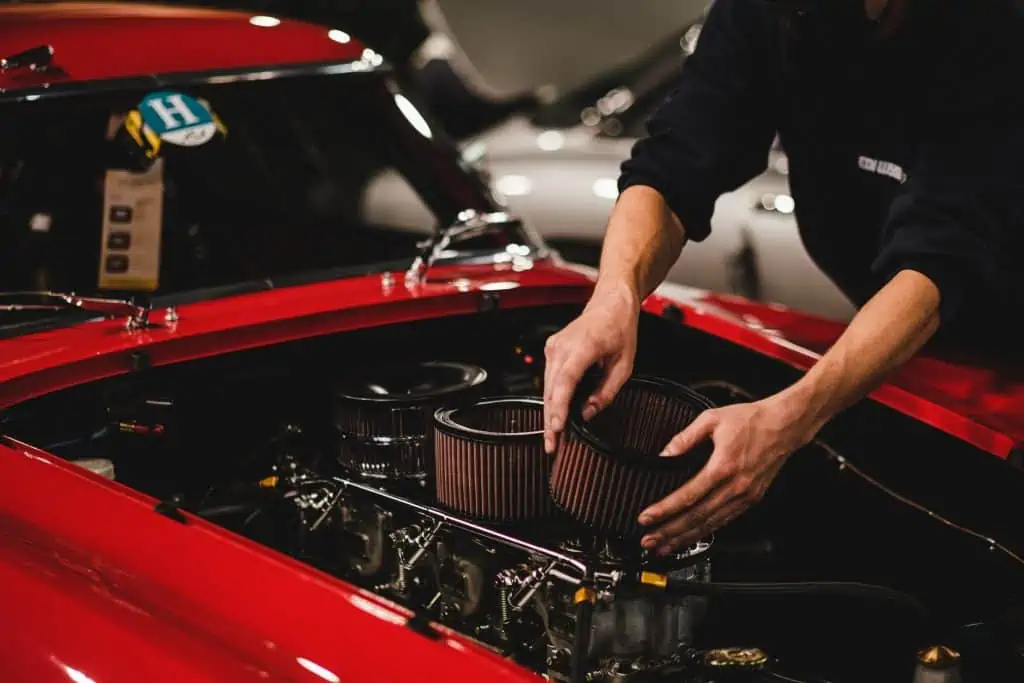
The Conclusion
Depending on how frequently you drive, one of these components is the air filter, which you should replace every two to four years.
The engine air filter replacement is one of the numerous vehicle maintenance duties you must keep up with. Numerous issues might arise from a dirty/clogged air filter, which can also make driving less pleasurable. A consequence of excessive usage may be higher gasoline costs for the car.
A vehicle’s parts all work together in harmony. A domino effect of issues arises from one mechanism to another when one component fails.
A bad filter may lead to many issues, such as dangerous emissions, broken spark plugs, wasted gasoline, and engine damage. Because of this, it is wise to keep an eye out for any potential damage to components.
If you see indications that your air filter is unclean, don’t panic. It’s an easy and inexpensive fix. You can avoid many of these easily avoidable issues and extend the life of your vehicle as long as your engine is regulated and breathing clean air.
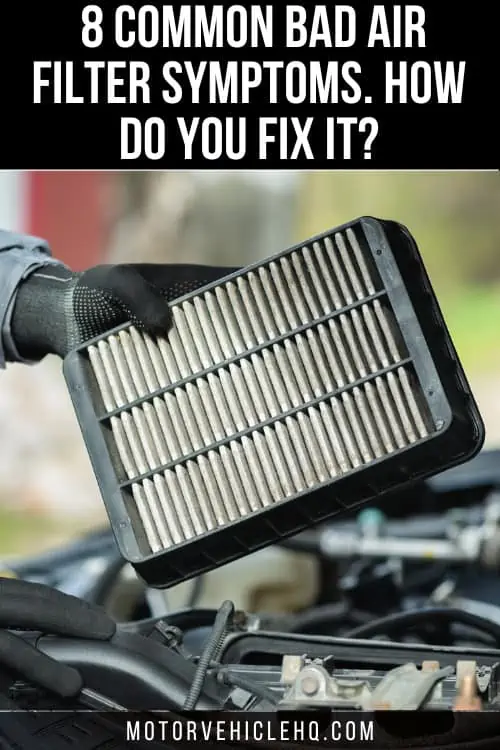

Nyangano Maurice specializes in vehicle troubleshooting and has more than 10 years of experience in the automobile industry. Over many years of experience as a car mechanic, he has acquired a broad range of skills, including engine repair, brake systems, electrical systems, and more. He frequently hosts community workshops and training programs to help motor vehicle owners understand their vehicles better.
